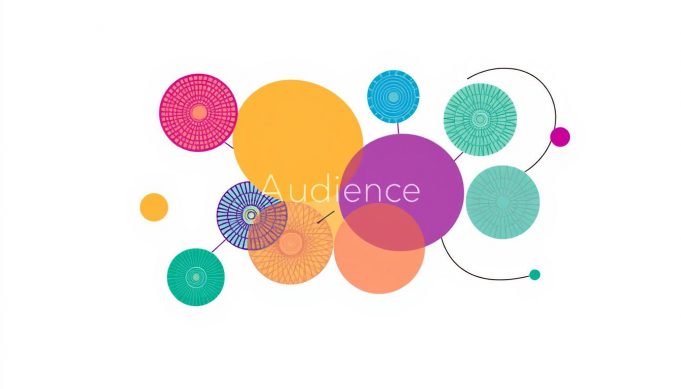Ever wondered how audience segmentation boosts your inbound marketing? With 80% of consumers more likely to buy when they feel seen, it’s key to know your audience1. By splitting your audience into groups, you can tailor messages that speak directly to each one. This leads to more engagement and happier customers1.
Segmenting your audience helps your marketing connect on a deeper level. This builds loyalty and keeps customers coming back1. Plus, it can boost your conversion rates by up to 14% with the right messages2. By using audience segmentation, you can make your marketing better and grow your business.
Key Takeaways
- Audience segmentation can enhance your inbound marketing efforts by creating personalized brand experiences.
- Targeted marketing messages can lead to increased engagement rates and improved customer satisfaction1.
- Audience segmentation can result in a conversion rate increase of up to 14% through targeted messaging2.
- Personalized marketing efforts can lead to higher conversion rates and increased brand loyalty1.
- Effective audience segmentation can reduce customer acquisition costs and improve overall marketing performance2.
- Audience segmentation can help you connect with your audience on a deeper level, resulting in increased brand loyalty and customer retention1.
Understanding Audience Segmentation in Inbound Marketing
Effective marketing segmentation is key for businesses to know their target audience. They can then make content that speaks directly to them. By doing a deep dive into who their ideal customer is, companies can tailor their marketing. This way, they can reach more people and get better results.
For example, using personalized marketing can boost conversion rates by up to 202%3. Also, making content just for certain groups can increase conversions by 25% on landing pages3. Companies like Spotify use data to make playlists for each user. This makes users more engaged and loyal4.
Some main advantages of audience segmentation are:
- More people engage with content that’s made just for them.
- Conversion rates go up because marketing is more personal.
- Companies save money by focusing on specific groups.
By using audience segmentation, businesses can make marketing strategies that really work. This improves their overall marketing success4.
Benefits of Audience Segmentation
Audience segmentation is key in inbound marketing, bringing many benefits. It helps you make content that speaks to each group, boosting engagement and sales5. This way, you send messages that hit the mark, leading to more clicks and sales3.
Some main advantages of audience segmentation are:
- Improved customer engagement: Personalized content boosts loyalty and engagement5.
- Higher conversion rates: Targeted marketing means more sales, which means more money3.
- More effective marketing strategies: You can craft marketing plans that meet each group’s needs5.
Studies show that smart use of audience segmentation can really pay off. Some companies see a 760% jump in sales from targeted marketing5. Also, 80% of shoppers are more likely to buy when they feel seen by brands3. By using audience segmentation, you can make content that speaks to your audience, leading to more engagement, sales, and revenue.
| Benefits of Audience Segmentation | Statistics |
|---|---|
| Improved customer engagement | 72% of marketers believe that customer engagement improves through personalized marketing enabled by audience segmentation5 |
| Higher conversion rates | Businesses that use audience segmentation see a 10 to 20% increase in conversions compared to those that do not segment their audience3 |
Types of Audience Segmentation
Understanding the different types of audience segmentation is key in customer segmentation tactics. By using effective marketing segmentation, businesses can make campaigns that speak to their audience. This is done through audience profiling techniques, which group customers by shared traits.
For example, audience segmentation helps target specific groups like age and income. This way, marketing efforts are more focused, leading to better results6. It also means messages are more personal, which boosts engagement and sales6.
Demographic Segmentation
Demographic segmentation focuses on age, income, and job. It helps businesses craft campaigns that hit the mark with certain groups. This leads to more people engaging and buying7.
Psychographic Segmentation
Psychographic segmentation looks at values, interests, and lifestyle. Using audience profiling techniques, businesses can make campaigns that really connect. This builds loyalty and keeps customers coming back6.
How to Identify Your Audience Segments
To make effective marketing, you must know your audience well. This means looking at customer data, using surveys, and checking social media for trends2. This way, you can make ads that really speak to your audience, boosting engagement and sales8.
Identifying your audience segments can be done through different methods. You can look at demographics, psychographics, and behavior9. This lets you tailor your content to meet each group’s specific needs and interests. For instance, analyzing your customer data can help you spot patterns. Then, you can craft ads that hit the mark.
Here are some perks of good marketing segmentation:
- Higher conversion rates
- Better customer engagement
- More successful marketing plans
By using these methods, you can craft a marketing plan that really speaks to your audience2. Also, social media can show you what your audience likes, helping you make content that they’ll enjoy8.
By taking these steps, you can build a solid marketing strategy. This strategy will help you understand your audience better and make more effective ads9.
Creating Targeted Content for Each Segment
Personalized content creation is key to better customer engagement and higher conversion rates10. Tailoring messages to different groups makes marketing more effective. This approach boosts customer happiness and loyalty through smart digital marketing11.
Here are some ways to make targeted content:
- Use personalization to connect with each group
- Make sure content meets customer needs and likes
- Use data to guide your marketing choices12
These methods lead to better customer interaction, more sales, and stronger marketing10. Segmentation in digital marketing is now essential for success. It helps businesses hit their target audience with exactness11.
Tools and Technologies for Audience Segmentation
Effective marketing segmentation starts with the right tools and technologies. You need to use customer segmentation tactics to split your audience into groups. This way, you can make your marketing more relevant to each group, boosting engagement and sales9.
Understanding your audience is key. Audience profiling techniques help you know what they like, do, and need. CRM systems and marketing automation platforms are great for this. They help manage data and create campaigns that work better98.

Analytics tools like Google Analytics give insights into how people interact with your site. This helps you analyze your segments better13. Using these tools can make your marketing more effective, building trust and business with your target audience. For tips on tracking social media, check out social media marketing techniques.
Using these tools can bring many benefits, including:
- Improved customer engagement and loyalty8
- Higher conversion rates through targeted campaigns9
- Enhanced user experiences leading to increased customer satisfaction9
Testing and Refining Your Segmentation Strategy
To get the most out of audience segmentation benefits, you need to keep testing and improving your plan. This means A/B testing content to see what messages work best for each group2. By looking at the data, you can find what needs work and make your marketing better2. Tools like Google Analytics 4 (GA4) help you understand what your audience likes and does2.
Creating content that speaks to each group is essential in digital marketing. When you make your messages fit what your audience wants, you’ll see more people engaging and buying14. In fact, personalized marketing can boost sales by up to 10 times14. Use segmentation in digital marketing to focus on what your audience likes and does.
Some key benefits of testing and improving your segmentation strategy include:
By following these tips and always improving your strategy, you can unlock the full power ofaudience segmentation benefitsand succeed in business214.
Case Studies: Successful Audience Segmentation
Effective marketing segmentation is key for businesses to reach specific groups. This makes content more personal and boosts engagement15. For example, over 70% of marketers see better results from segmenting their audience16.
Learning from successful audience segmentation can help your marketing. By analyzing data and listening to feedback, you can understand your audience better15. This lets you create content that speaks directly to them, leading to more engagement and sales16.
Some key statistics show why audience segmentation matters:
- Companies that segment their audience well see a 30% boost in conversion rates16.
- About 64% of B2B marketers use personas to tailor their messages16.
- Lead nurturing campaigns that segment well get 50% more sales-ready leads at a 33% lower cost16.

Investing in audience segmentation tools helps businesses improve their strategies15. This way, they can keep up with changing audience preferences15. It leads to steady customer growth and being seen as industry leaders15.
| Segmentation Strategy | Conversion Rate Increase |
|---|---|
| Detailed audience segmentation | 30%16 |
| Persona-based marketing | 50%16 |
Common Pitfalls to Avoid in Audience Segmentation
When you start audience segmentation, knowing the common mistakes is key. Over-segmenting can make your marketing less effective17. Also, ignoring data privacy and ethics can harm your legal and reputation status. To steer clear of these issues, aim to create content that speaks directly to your audience. This way, you’ll get the most out of audience segmentation and personalized content.
Here are some important tips for good audience segmentation:
- Don’t overdo it by focusing on a few main segments17
- Make sure data privacy and ethics are top priorities18
- Use segmentation tools to find detailed criteria for your audience18
- Make content that meets the specific needs of each group19
By keeping these tips in mind and using audience segmentation wisely, you can make your marketing more effective. Studies show that personalized content can sway consumer choices. For example, 71% of people say personalized content can make them more likely to open marketing emails19. By avoiding common mistakes and focusing on personalized content, you can fully benefit from audience segmentation in digital marketing.
Future Trends in Audience Segmentation
Marketing is always changing, and so are audience segmentation strategies5. New technologies and what people want are key to these changes5. Artificial intelligence (AI) and machine learning will help a lot. They let marketers understand customers better and offer them what they want20.
AI tools give businesses a deep look into who their customers are20. This leads to better interactions and more sales. It’s all about making experiences personal and meaningful.
What people want from brands is always changing20. Marketers need to keep up with these changes5. They should watch for trends like social media and mobile use. This way, they can reach their audience in the best way possible.
Staying up-to-date with new ideas is key for better marketing20. By using the latest tools and understanding what customers need, you can make your marketing really work5. This will help your business grow in amazing ways.
FAQ
What is audience segmentation and how can it enhance inbound marketing efforts?
What are the different types of audience segmentation?
How can audience segmentation improve customer engagement and conversion rates?
What are the key steps in identifying and understanding your audience segments?
How can businesses create targeted content for each audience segment?
What tools and technologies can help with audience segmentation and personalization?
How can businesses test and refine their audience segmentation strategies?
What are some common pitfalls to avoid in audience segmentation?
What are the future trends in audience segmentation and personalization?
Source Links
- ▷❤️How can audience segmentation enhance your inbound marketing efforts? – CertificationAnswers – https://en.certificationanswers.com/hubspot-inbound-marketing-certification-answers/how-can-audience-segmentation-enhance-your-inbound-marketing-efforts/
- How Can Audience Segmentation Enhance Inbound Marketing? – https://vsslagency.com/resources/how-can-audience-segmentation-enhance-inbound-marketing/
- Learn Inbound Marketing Efforts & Audience Segmentation – https://www.cumberland.college/blog/learn-about-inbound-marketing-efforts-and-audience-segmentation/
- Enhancing Your Inbound Marketing with Audience Segmentation: A Comprehensive Guide – https://www.beeliked.com/blog/guide-to-boost-inbound-marketing-with-audience-segmentation
- How Can Audience Segmentation Enhance Your Inbound Marketing Efforts – https://yesassistant.com/how-can-audience-segmentation-enhance-your-inbound-marketing-efforts/
- What is Audience Segmentation? Model, Tips and Examples – https://www.meltwater.com/en/blog/audience-segmentation
- What is Audience Segmentation? Types, Tips and Examples – GWI – https://blog.gwi.com/marketing/audience-segmentation/
- How Can Audience Segmentation Enhance Inbound Marketing Efforts? – Responsify – https://www.responsify.com/how-can-audience-segmentation-enhance-inbound-marketing-efforts
- How Can Audience Segmentation Enhance Your Inbound Marketing Efforts – Vonazon Full Service Marketing Agency – https://vonazon.com/blog/marketing-strategy/how-can-audience-segmentation-enhance-your-inbound-marketing-efforts/
- How can audience segmentation enhance Inbound Marketing efforts? – https://42dm.net/practical-tips-how-can-audience-segmentation-enhance-your-inbound-marketing-efforts/
- How can audience segmentation enhance your inbound marketing efforts? – https://www.donovandigitalsolutions.com/blog/how-can-audience-segmentation-enhance-your-inbound-marketing-efforts
- Audience Segmentation: How to Enhance Your Inbound Marketing Efforts – https://velainn.com/blog/audience-segmentation-how-to-enhance-your-inbound-marketing-efforts
- How Can Audience Segmentation Enhance Your Inbound Marketing Efforts? – https://customers.ai/articles/inbound-audience-segmentation
- Audience Segmentation: The Key to Enhancing Your Inbound Marketing Strategy – elfo – https://www.elfo.com/blog/audience-segmentation-the-key-to-enhancing-your-inbound-marketing-strategy/
- 7 Ways to Segment Your Audience & Drive Sales – https://zetaglobal.com/resource-center/7-ways-to-segment-your-audience-drive-tangible-sales/
- What is Audience Segmentation? How Can Audience Segmentation Enhance Your Inbound Marketing Efforts? – https://www.weidert.com/blog/audience-segmentation-for-inbound-marketing
- Segmenting Your Audience: Best Practices | OnePulse – https://www.onepulse.com/audience-segmentation-best-practices/
- Audience Segmentation — The Beginner’s Guide – https://www.gosquared.com/blog/audience-segmentation
- 7 Segmentation Mistakes That Are Costing Your Business Money – https://www.singlegrain.com/marketing-strategy/7-segmentation-mistakes-that-will-cost-your-business-money/
- No title found – https://eventespresso.com/2024/07/audience-segmentation/












